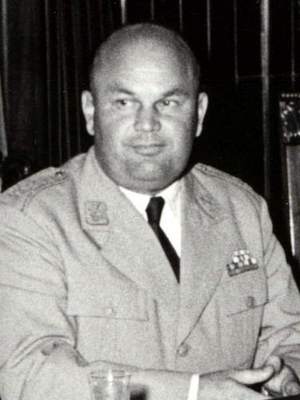Janko Bobetko facts for kids
Quick facts for kids
Janko Bobetko
|
|
|---|---|

General Janko Bobetko in 1957
|
|
| Born | 10 January 1919 Crnac (part of Sisak), Kingdom of Serbs, Croats and Slovenes |
| Died | 29 April 2003 (aged 84) Zagreb, Republic of Croatia |
| Allegiance | |
| Years of service | 1945–1971 (JNA) 1992–1995 (HV) |
| Rank | Lieutenant General (JNA) General of the Army (HV) |
| Commands held | Chief of General Staff (HV) Commander of Southern Front (HV) Chief of Staff of 5th Army District (JNA) Political Commissar of 32nd Division Political Commissar of Brigade |
| Battles/wars | World War II Croatian War of Independence
|
Janko Bobetko (born January 10, 1919 – died April 29, 2003) was an important Croatian general. He played a big role in two major conflicts: World War II and later the Croatian War of Independence. He was one of the people who helped start the 1st Sisak Partisan Detachment, which was the first group in Yugoslavia to fight against fascism during World War II. After the war, he had a long career in the Yugoslav People's Army (JNA).
In 1992, Bobetko became the top military leader for Croatia, serving as the Chief of the General Staff of the Croatian Army (HV). He held this important position until he retired in 1995.
Contents
Early Life and Education
Janko Bobetko was born in a village called Crnac, near Sisak in what was then the Kingdom of Serbs, Croats and Slovenes. He went to the University of Zagreb to study to become a veterinary doctor. However, at the start of World War II, he was forced to leave the university. This happened because the authorities at the time, who supported the Nazis, did not agree with his strong anti-fascist beliefs.
Fighting in World War II
In July 1941, Janko Bobetko joined a group that was fighting against fascism. This group was called the 1st Sisak Partisan Detachment, and they were based in the Brezovica Forest near Sisak. Bobetko fought with the Yugoslav Partisans from 1941 to 1945. During this time, his father and three brothers were tragically killed by the Ustashe, a group linked to the Nazis.
He was badly hurt during a battle in Montenegro, known as the Battle of Sutjeska. Even though he was seriously injured, he survived and went on to become an officer in the Yugoslav People's Army (JNA) after the war.
Military Career After World War II
After World War II, Janko Bobetko continued his military education. He graduated from the Military Academy of the Yugoslav People's Army. He rose through the ranks and eventually became a lieutenant-general.
In the early 1970s, there was a period called the Croatian Spring. During this time, many people in Croatia wanted more independence for their region within Yugoslavia. Bobetko supported these ideas. Because of his views, he was removed from his position and expelled from the JNA in 1972. This happened after Tito, the leader of Yugoslavia, took strong action against people he saw as trying to separate parts of the country.
Leading the Croatian Army
After Croatia became an independent country, Janko Bobetko played a crucial role. In 1990, he was offered the job of defense minister, but he did not accept it. His involvement in the Croatian War of Independence began in the Banovina area. Later, he took command of the Southern Front on April 10, 1992.
On November 20, 1992, Bobetko was appointed the Chief of the General Staff of the Armed Forces of the Republic of Croatia. This meant he was the highest-ranking military officer in Croatia.
Key Military Operations
In 1993, during Operation Medak pocket, Croatian soldiers aimed to stop Serbian forces from attacking the town of Gospić. Bobetko later described this operation as "brilliant" in his 1996 book, All My Battles. This book included many military maps and details about the commands given during the war.
Bobetko had some health challenges. He had a disability from his leg injury during World War II, and later developed heart problems. Because of his health, he was in the hospital in 1995 during Operation Flash.
On July 15, 1995, just before a major operation called Operation Storm, President Franjo Tuđman officially replaced Bobetko as the Chief of General Staff with Zvonimir Červenko. Later that year, Bobetko was elected to the Croatian Parliament as a member of the Croatian Democratic Union (HDZ) party. He served as a Member of Parliament until 1999.
Later Life and Legacy
In 2000, Janko Bobetko was a prominent person who signed the Twelve Generals' Letter. He passed away in 2003 at the age of 84.
Bobetko was survived by his wife, Magdalena, and their three sons.
Honors and Awards
- Grand Order of King Petar Krešimir IV (1995)
- City of Zadar Lifetime achievement Award (2020)
 | Delilah Pierce |
 | Gordon Parks |
 | Augusta Savage |
 | Charles Ethan Porter |

